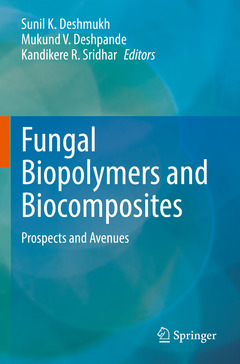Fungal Biopolymers and Biocomposites, 1st ed. 2022 Prospects and Avenues
Coordonnateurs : Deshmukh Sunil K., Deshpande Mukund V., Sridhar Kandikere R.

The book covers an overview of fungal polymers, fungal mycelial biomass, and their applications besides providing a detailed account of various opportunities. This book also includes information on developments in mycotechnology related to fashion, furnishing, construction, packaging, mycelial-based bricks, construction binder, cementing materials, and so on. Other aspects include the value of chitin, chitosan, hydrophobins, lignocellulosic composites, oil recovery, biosurfactants and bioemulsifiers, nanofibers from pullulan, exopolymeric substances, bioresins, and biocomposites. Additional topics covered in the book include self-healing fungal concrete (which could help to build repairs) and recipe to inhibit fruit body formation, for living fungal biomaterial manufacture. There is no comprehensive book other than ? some reviews, which addressed very brief historical developments and preliminary aspects of fungal biopolymers. Written by experts in their field from countries like Australia, India, USA, Germany, Turkey, Philippines, Oman, Belgium, Italy, Egypt, Brazil, and the United Kingdom, the chapters discuss at length applications of filamentous fungi in sustainable industrial pursuits and industrial developments with environmental safety. This book will be useful for students, teachers, researchers, and scientists in botany, microbiology, life sciences, biotechnology, agriculture and, industries that extensively use fungi for the production of value-added products.
Chapter 1. Biopolymers from fungi and their applications.- Chapter 2. Fermentation processes for production of fungal biopolymers with industrial applications.- Chapter 3. Fungal Hydrophobins.- Chapter 4. Fungal Exopolymeric Substances and Their Applications.- Chapter 5. Production and Application of Nanofibres from Pullulan.- Chapter 6. Using fungal biopolymers for enhanced oil recovery.- Chapter 7. Fungal Polysaccharides as Biosurfactants and Bioemulsifiers.- Chapter 8.Challenges and Advantages of Building with Mycelium-Based Composites: A Review of Growth Factors that Affect the Material Properties.- Chapter 9. Applications of fungal mycelium-based functional biomaterials.- Chapter 10. Fungal Biopolymers as an alternative Construction Material.- Chapter 11. Packaging Applications of Fungal Mycelium-Based Biodegradable Composites.- Chapter 12. Fungi for Material Futures: the Role of Design.- Chapter 13. Production of bioresins from fungal mycelia.- Chapter 14. Laccase mediated green composite synthesis: A name synonymous with each other.- Chapter 15. Marine fungi as a source of Biosurfactants and Bioemulsifiers.- Chapter 16. Lignin fungal depolymerization: from substrate characterization to oligomers valorization.- Chapter 17. From Blue Pigment to Green Technology: Properties and Applications of Fungi-Derived Pigment Xylindein.
Mukund V. Deshpande obtained his Ph.D. in 1982 in Biochemistry and D.Sc. in Microbiology from the University of Pune in 1994. He has been working extensively on the use of fungi and fungal products in Biotechnology. Dr. Deshpande successfully completed more than 35 research projects funded by national and international funding agencies like Indo-Swiss Collaboration in Biotechnology (ISCB) for the development of mycoinsecticide, Indo-Belarus programme of DBT on biopesticides, Indo-Mexico programme on fungal dimorphism, to name a few. Dr. Deshpande is an elected fellow of Maharashtra Academy of Sciences (FMASc, 1994) and the Society for Biocontrol Advancement (FSBA, 2010). He has to his credit more than 160 research papers, reviews and chapters, 8 patents, 8 books and a number of popular articles. He has his own start-up Greenvention Biotech located in Uruli-Kanchan, Pune for the translati
Date de parution : 06-2023
Ouvrage de 421 p.
15.5x23.5 cm
Date de parution : 06-2022
Ouvrage de 421 p.
15.5x23.5 cm



